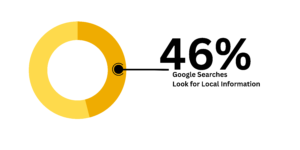In this competitive world, all businesses wish and strive to be at the top of search results. SEO, or search engine optimization, plays a crucial role in digital marketing by enhancing visibility, driving traffic, and increasing conversions for businesses of all sizes. However, the landscape of SEO is constantly evolving. New techniques, shifts in user behavior, and updates to search engine algorithms frequently reshape our understanding of effective SEO strategies.
Staying current with SEO trends until 2025 is essential if you wish to remain ahead of the competition. From artificial intelligence-powered searches and mobile device usage, knowing the most essential SEO metrics will allow you to hone your approach and boost results.
Here are the 12 most important SEO statistics for 2025 and how you can use them to enhance your online marketing efforts.
1. ChatGPT Search Interest is Skyrocketing
One of the major shifts like search is the increasing popularity of AI-powered platforms such as ChatGPT. According to Statista, its keyword hit its highest index point level ever in June 2024 at over 100 index points – while popularity dwindled towards the end of 2024, still showed steady increases over time that suggests increasing dependence on artificial intelligence tools for data gathering purposes.
What does this mean for advertisers? Content creation designed specifically to address AI-driven conversations is becoming ever more critical, particularly as more consumers use platforms like ChatGPT for information-gathering purposes. Being visible within search results for AI queries requires creating structured conversation-focused, short, and informative posts specifically for these search engines if you wish to stay ahead of the competition and stay ahead of any queries generated from AI searches.
2. Dominancy of Search Engines
With the rapid expansion of AI-powered platforms such as ChatGPT, many users still rely on traditional search engines as the source of information. According to SEMrush data, 54% of ChatGPT queries don’t use its built-in search feature. Many users prefer gathering their information through other means like the traditional engines for searching.
This data illustrates that marketers must adapt to both traditional search engines (like Google) and many AI platforms for SEO strategies to be successful. AI search engines may be expanding, while traditional search engines remain more dominant. Your SEO strategy should consider improving content on both AI platforms as well as search engines to ensure your brand image is seen by all platforms.
3. 65% of marketers see improved SEO results by utilizing AI Tools

AI is no longer just an arcane concept for marketers. It has become a fundamental requirement. According to recent research conducted, 68% of marketers reported increased SEO results from using AI tools, in addition, 70% of marketing professionals say AI has enhanced content quality significantly.
Artificial Intelligence tools like SEMrush, Ahrefs, and SEO Surfer are revolutionizing the SEO landscape by offering advanced keyword research tools as well as content optimization and competition analysis capabilities. Marketing professionals using AI devices such as these can streamline workflows while improving content more quickly for improved SEO results – now is a good time to make this leap into AI as part of their toolbox. If AI technology has yet to make an appearance in your SEO toolbox this may be your chance.
4. Google is the leader with 89.74 %
Google Leads with an 89.74 % market share despite AI-powered search platforms such as Bing, DuckDuckGo, and Baidu’s impressive market shares of up to 87% each respectively, Google remains undisputedly on top by boasting an astounding market share percentage of 89%. This places them far ahead of all their competition such as Bing DuckDuckGo and Baidu combined.
As marketers, this means Google should be the centerpiece of SEO efforts. While researching new technologies and platforms (such as AI-driven search), optimizing your website for Google’s algorithms must remain your main priority when planning an SEO strategy. Stay abreast of any updates or developments related to Google so your site remains highly ranked in its search results.
5. 46% of Google Searches Have Local Intent

Searching locally has become more important than ever. Research indicates that 46 % of Google searches are for local services or products. This highlights the importance of local SEO, which enables businesses to target customers in their immediate vicinity.
If your business operates in a specific area, optimizing for local SEO is essential. This involves ensuring you have a Google My Business listing, tailoring your website for local keywords, and creating content that resonates with your local audience. By focusing on local SEO, you can significantly improve your search rankings and connect with potential customers in your area.
6. 72.59 % of Google Traffic comes from Mobile Devices

Mobile optimization should no longer be considered an optional expense. It has become essential, according to recent research, 72.59% of Google traffic comes from mobile devices. This shows an increase from previous studies that continues unabated. With more people accessing the web on tablets and smartphones, making sure your site is mobile-friendly is an essential step toward maintaining visibility and engagement with visitors.
Test that your website is optimized for mobile devices by insisting upon responsive design, fast loading speeds, and user-friendly navigation. An optimal mobile-friendly site not only enhances the user experience but will also boost your ranking on Google’s mobile-first indexing.
7. Google’s Core Updates Are Shaking Up SERPs
Google’s core updates continue to make an impactful statement about search engine result pages (SERPs). In 2024 alone, they introduced various major updates, one being March’s biggest of which caused an increase of up to 45% in low-quality, non-original results in searches.
Content creation for marketers has never been more crucial. Google’s algorithms give more weight to content that satisfies these criteria. So be sure your posts answer your user’s questions directly in order to stay abreast of Google updates and remain compliant.
8. 75% of Users Never Scroll Past the First Page
It’s well-known that reaching the top of Google is essential for driving traffic. According to HubSpot, 75% of users don’t go beyond the first page of results, and nearly 30% click on the first organic result. This data highlights the significance of SEO efforts aimed at securing the top position on Google’s first page. To accomplish this, you need a comprehensive SEO strategy that includes high-quality content, on-page optimization, and effective link-building techniques. Securing the top spot on Google can significantly boost the organic traffic to your site.
9. Voice Search is on the Rise
Voice search is becoming a popular way for people to interact with their devices. According to Google, 20% of the global population uses voice search, with smart speakers and voice assistants gaining traction in both homes and businesses.

To optimize your content for voice search, it’s important to use natural language and phrasing in your posts. Voice search queries are often longer and more conversational, so focusing on long-tail keywords and questions is essential. To stay relevant, your content should reflect how people speak, rather than just how they type.
10. Video Content Boosts SEO Success
Video content remains an effective SEO tool. A recent study by Wyzowl found that 88% of marketers obtain leads via video, while Finances Online predicts it as being one of the fastest-growing digital ad sectors.

Integrating video into your SEO strategy can improve user engagement, time spent on site, and lower bounce rates, leading to higher rankings. By producing informative and entertaining videos for SEO purposes, you will increase traffic to your site while improving its visibility and improving its searchability
11. 50% of SEO Pros Believe Social Search Will Improve Traffic

Social media is becoming more and more crucial for SEO. According to a study by HubSpot, half of SEO experts think that social media will enhance search traffic in the coming years. Additionally, 48 percent of SEO professionals believe that Google’s AI-driven reviews will have a positive effect on search engine traffic. By integrating social media into your SEO strategy, you can boost both traffic and rankings in search results. Platforms such as Instagram, YouTube, and LinkedIn are key players in this process.
12. AI-generated content is Gaining Traction
The amount of AI-generated content is on the rise, with 12.4 percent of Google search results currently featuring significant levels of such content. While adoption rates are higher in sectors like e-commerce and local services, AI tools are increasingly being used to streamline content creation.
AI assists marketers in producing content more quickly, but it’s essential to maintain quality. AI should enhance human creativity rather than replace it. Ensure that any AI-generated content is informative, accurate, and aligns with your company’s voice to build trust with your customers.
The SEO statistics show the landscape in 2025 will be more dynamic than ever. With AI, voice search, and mobile optimization at the forefront, marketers must remain adaptable to these emerging trends. To thrive in today’s competitive digital environment, it’s crucial to enhance content quality and boost efficiency.

